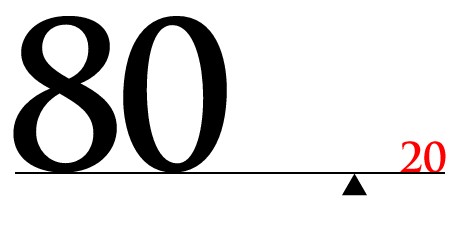
“Only one of my five sales people actually makes a difference!” thundered the sales director. He went on: “3 of them are ok, they take the orders without messing up. Then there is the one that is actually preventing orders from coming in through poor communications mishandling the prospect”. But then there is the one: ‘Graham GetheOrder’ – the great salesman, who does make a difference – gets orders where the others wouldn’t – maximises the sales. Oh if only all five could be as good as him or her!
This is an example of the Pareto principle. The 80/20 rule. Wikipedia states: Wikipedia The distribution is claimed to appear in several different aspects relevant to entrepreneurs and business managers. For example:

· 80% of a company’s profits come from 20% of its customers
· 80% of a company’s complaints come from 20% of its customers
· 80% of a company’s profits come from 20% of the time its staff spend
· 80% of a company’s sales come from 20% of its products
· 80% of a company’s sales are made by 20% of its sales staff
Therefore, many businesses have an easy access to dramatic improvements in profitability by focusing on the most effective areas and eliminating, ignoring, automating, delegating or retraining the rest, as appropriate.
Digging around the internet I found some interesting comments relating to CRM and Pareto.
- Let’s say 20% of your sales reps bring 80% income, so you should improve their working conditions and reward them.
- If 20% of CRM features handle the 80% of tasks and activities, it is highly advisable to focus on these options and engage more employees to their usage.
- 20% of your customers contribute 80% of your revenue. Providing a better service for this clients will make them return to your company.
- Usually, 80% of complaints come from the 20% of customers. So, you can enable them with a knowledge base and FAQ section for reducing the number of requests.
What Makes a Great Sales Person?
Going back to our 1 in 5 great sales person. What makes him or her so good?
Interesting research by http://www.insightsquared.com revealed:
- Great Reps Close 80% More Deals, The main reason the best reps bring in more revenue each quarter is because they close significantly more deals. This might not be an earth-shaking revelation, but the magnitude is surprising: top reps close nearly twice as many deals each quarter as average reps.
- Great Reps Win 20% Larger Deals, Another way the best reps bring in more revenue each quarter is by closing deals that are, on average, 20% larger than the deals closed by their co-workers. Successfully working more valuable, more complex opportunities is a difficult skill, but one that the best reps appear to have.
- Great Reps DON’T Have Higher Win Rates or Shorter Sales Cycles, Two things that don’t separate great reps? Win rate and sales cycle length. In our study, these metrics were almost identical for the best and worst reps.Top reps are not using a drastically different process or demonstrating unusually effective closing skills – they outperform their peers by working more (and slightly larger) opportunities without hurting their win rate and sales cycle. Improve your sales team’s results by training bottom reps to more efficiently manage their pipelines and get better at identifying winning opportunities early in the sales process. Key Takeaway: Great Reps Can Work More Opportunities.
How does CRM help?
CRM helps our Great Sales Person by:
- Organising his/her opportunities. Working more opportunities.
- Tracking opportunities, which stage is each one is at.
- Prioritising opportunities, picking the best prospects.
- Efficiently manages his/her pipeline, making sure then none are missed.
Understanding the Pareto principle and its effect on your CRM can have a dramatic impact on company performance. Want to be a great sales person? Make sure you have a great CRM setup.